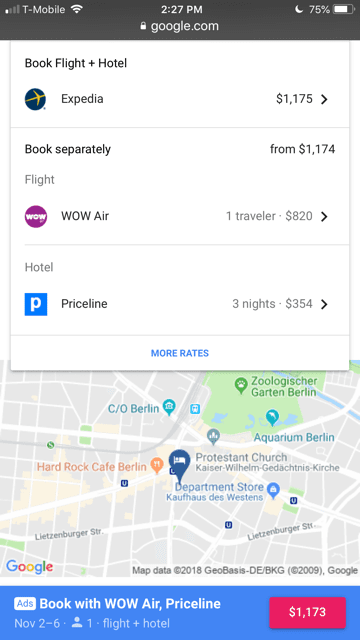Skift Take
When Google perfects vacation package search, this could be a very compelling product because some have tried, but few are doing it in any meaningful way. This is all part of Google's steady and ongoing rise in the travel e-commerce ecosystem.
For anyone who’s ever shopped online for a vacation package where the flight and hotel are bundled together, you’ll know it can be a tedious exercise.
First you might find a holiday package on Expedia, for example, and then you’ll have to figure out at least two things: Is it cheaper to book the package versus buying the flight and hotel separately, and then you’ll want to search to see whether another vendor, such as Virgin Vacations, has a better deal.
The process can be frustrating because there are a lot of variables, and the rates change frequently, too.
Enter Google, which has been testing vacation rental metasearch, where users are transferred to third parties for bookings in the UK and Germany within its Destinations category since the spring of 2017.
Speaking at Skift Global Forum last month, Richard Holden, Google’s vice president of product for travel, said that effort will be expanding in a number of ways.
“We do offer it now in the UK, Germany and the U.S.,” Holden said. “I would still say that it’s not prominent in its display at the moment; it’s fairly buried in the destinations experience. The next version of this we’re working on at the moment to make it more prominent and Germany is actually probably the first market that we’re most focused on simply because Germany is a very large package travel market as a whole.”
Skift has seen the product on Google in a number of forms: on desktop in the Destinations section and in the Travel Guide category, and at the very top of the page under Destinations in Google Germany or further down underneath paid ads in Google U.S. desktop.
But, the vacation package search product, which is likewise on mobile, is indeed becoming more prominent, although it is far from perfected, as can be expected with such a complex feature. But Google is already addressing some of the pain points in vacation package search, albeit in a rudimentary way so far.
Holden explained Google’s thinking.
“But we still think this is a great opportunity from a transparency standpoint,” Holden said. “Users just don’t know where to find this data. There is no great place to go to understand all the packages that are offered out there and from a transparency standpoint, we’re also trying to show people what that package travel would look like and what the component pricing looks like so they can compare right there.”
On mobile in the U.S., we entered Germany vacation packages on Google and found 102 options for trips to Berlin, for example, along with a widget to refine dates and destinations, as well as maps, amenity descriptions, photos, ratings, and reviews.

An Expedia vacation package for a Wow Air flight and a 3-night stay at the Sofitel Berlin Kurfürstendamm shown on Google.
For Berlin, we found several Expedia flight and hotel packages, including those for a Sofitel Berlin Kurfürstendamm-Wow Air three-night package from New York City in early November for $1,175 per person; a Park Inn by Radisson Berlin-Wow Air package for $1,061; and Steigenberger Hotel Berlin-Wow Air package for $1,157.
Along with each Expedia package price, Google listed the price for booking the flight and hotel separately from Wow Air and Agodo or Priceline, for example.
The main value proposition in packages is the traveler is supposed to get a considerable discount because the airlines and hotels can fill seats or beds without disclosing the pricing on the individual components because the traveler only sees the package price. The hotel or airline therefore can offer discounts without diluting their published rates.
Ironically, though, the differences in the package prices and those when someone books the individual components separately that we saw on Google were not very large, sometimes nonexistent. For example, the Expedia package for the Sofitel Berlin Kurfürstendamm-Wow Air package was $1,175 versus $1,173 when the flight would be booked on Wow Air and the hotel on Priceline.com.
As noted, Google’s vacation package search is very much a work in process. We’d expect in the future to find considerable discounts for vacation package prices versus booking the flights and hotels separately.
But Google will work out the kinks, and the ability to compare holiday packages from vendor to vendor, and also to determine the discount versus individual components one one place will be a compelling premise since there aren’t many easy ways to do that today.
In other news, Holden said Google is now offering a way for consumers to search for vacation rentals outside the United States in major metropolitan areas.
“We struggled for a little while as to what’s the right way to integrate those offerings,” with hotels, Holden said. “We are actually offering it now outside the U.S. as a filter in hotel search in major metropolitan areas. There’s content that you can filter in to see alternative lodging or vacation rental content. Typically today, the content that we have there is apartment-like, it’s most hotel-like properties, though we will be in the near future moving into a broader set of properties as well. We think it’s hugely relevant.”
The Daily Newsletter
Our daily coverage of the global travel industry. Written by editors and analysts from across Skift’s brands.
Have a confidential tip for Skift? Get in touch
Tags: expedia, google, holiday packages, metasearch, sgf, sgf2018, vacation packages, vacations
Photo credit: Beach-goers enjoyed the sands at the Jersey shore in New Jersey after Hurricane Sandy. 103096 / 103096